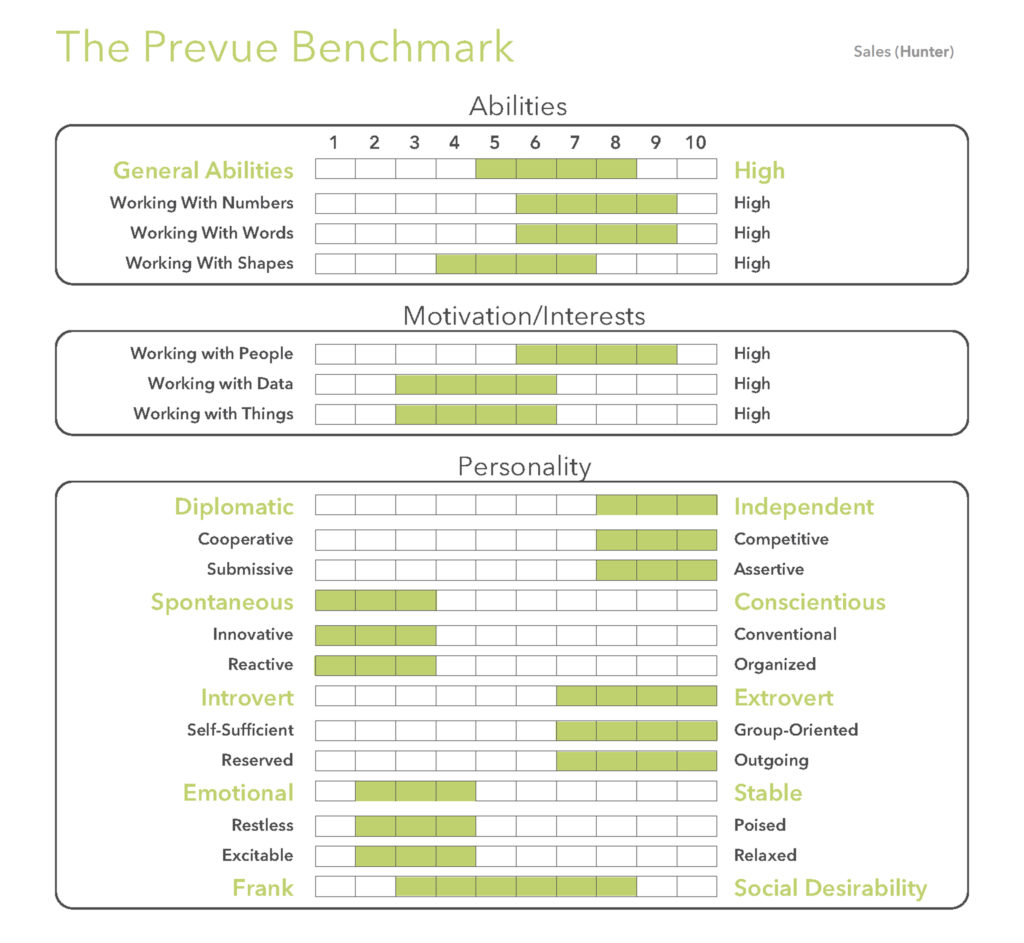Part One: Identifying Sales Hunters is the Key to Building a Successful Sales Team
Building a potent sales team is a challenge for any company; however, accruing passionate individuals with a great deal of potential is the key to success. As such, employers are always on the lookout for candidates that fit this description. In part 1 of this 3-part series by Mike Campanella, President & CEO of Prevue, he explores what makes successful salespeople and the different profiles of salespeople.
Salespeople are adept self-promoters. They are skilled at “selling” themselves. In an interview scenario, these individuals will claim to have a strong workplace aptitude for sales. In fact, they will assert that they are remarkable salespeople, and many will claim to be the very best.
Of course, this isn’t true of every individual that makes such claims. Yet, many companies continue to hire people based on how they appear in interviews. Similarly, many employers rely on resumes to inform their decisions. Unfortunately, many resumes are exaggerated, and much of the information may not even be entirely true. Even references may be misleading, as previous employers have a bias – not to mention, who gives a bad reference?
Although many people may have the capacity to make some sales, very few of them will truly thrive in a sales environment. Not only is it a high-stress job, but individuals must have an incredibly “thick skin.” Moreover, they must be highly self-motivated and feel energized, rather than drained, by competition.
Only candidates with a very specific personality profile will succeed in sales. In order to reduce employee turnover, companies must ensure that they correctly identify individuals that have the greatest potential for long-term success.
The Sales Hunter
A sales hunter has the unique capacity to thrive in this high-stress environment. They are fiercely independent and passionate people, and they are extremely difficult to find. With that being said, they drive sales teams ahead. Rather than waiting for cues to move forward, these individuals take the lead. As such, they “hunt” for new opportunities with tenacity. They don’t take issue with asking for a sale and do so with ease. And, even if they lose a sale, they are able to quickly move on to the next acquisition; they don’t allow failure to keep them from their goals.
Conversely, a less determined individual will burn-out in this boiler-room environment. It takes an extremely resilient person to withstand the pressure that comes with competition and rejection. More importantly, an individual must be energized by a fast-paced atmosphere to truly flourish in a sales environment. Hunters are highly emotional and competitive individuals. Therefore, they quickly seize new opportunities in order to gain as many clients as possible.
Sales hunters are quick, innovative thinkers, who easily navigate the sales experience. They are also highly personable and have excellent communication skills. As a result, they’re highly persuasive, which allows them to close sales. And, while they’re also very persistent, they don’t come off as unnecessarily pushy; they determine where someone stands in the sales process and act accordingly.
Sales Hunter Benchmark
To determine whether a candidate meets a hunter’s profile, employers must perform pre-employment testing. Creating and using a Sales Hunter Benchmark will help measure a candidate’s suitability against the ideal blueprint for this role. An ideal prospect’s personality assessment will appear as a lightning bolt on the Prevue Benchmark. Specifically, the most talented hunters have major extremes on their graph. As such, companies that don’t deviate from hiring individuals that have this lightning bolt result will experience the greatest success.
Although sales environments vary between companies, any business that needs to acquire multifold new clients must hire these individuals. Indeed, the average sales candidate simply doesn’t have the raw talent required to strike out into highly unpredictable situations and make quick acquisitions. And, while they may have some initial success, they’ll find that they are easily discouraged by rejection or the sheer volume of interactions.
In contrast, a hunter thoroughly embraces the sales process. As such, they are able to creatively adapt their pitch to each individual sale. They have a general process but modify their behaviour during each encounter. The Prevue Assessments ensures that candidates aren’t able to “outsmart” the test, or figure out the most desirable answers, and ensure accurate, reliable results that identify these individuals every time.

You can find Part Two of this three-part series here: How to Hire the Most Talented Candidate for Every Sales Role
You can find Part Three of this three-part series here: Why Even Talented Sales Teams Fail